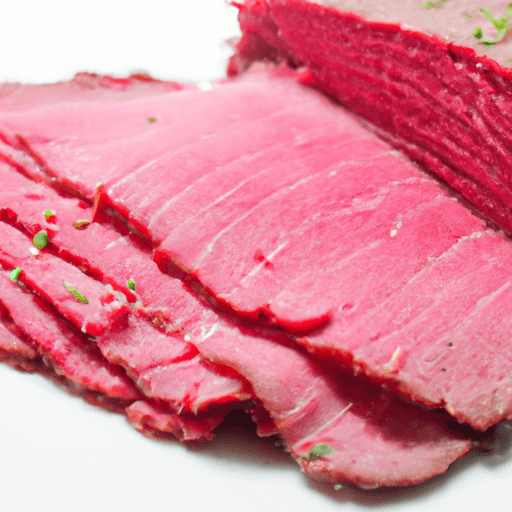The Lean and Delicious World of Corned Beef
When it comes to hearty and flavorful meats, few can compare to the deliciousness of lean corned beef. Whether you’re a fan of a classic Reuben sandwich or love experimenting with new recipes, this tender beef is a versatile addition to any kitchen. In this blog post, we’ll delve into the tantalizing taste, common uses, nutritional value, and interesting history of this culinary delight.
Taste that Leaves You Craving More
Corned beef is known for its robust and savory flavor that melts in your mouth. The meat gets its name from the corn-sized salt crystals, known as “corns,” used to brine and cure it. This process infuses the beef with a unique blend of seasonings, typically including garlic, peppercorns, coriander seeds, and bay leaves. As a result, the meat boasts a rich, salty, and slightly tangy taste that tantalizes the taste buds.
Versatile in the Kitchen
One of the reasons corned beef remains a beloved choice for many home cooks is its versatility in the kitchen. While it’s often associated with classic Reuben sandwiches piled high with sauerkraut, Swiss cheese, and Thousand Island dressing, this meat offers a wide range of culinary possibilities.
Corned beef can be slow-cooked, thinly sliced, and enjoyed in sandwiches or as the star of a deliciously hearty breakfast hash. It also pairs exceptionally well with steamed vegetables, mashed potatoes, or transformed into delectable corned beef and cabbage stew. Additionally, it can be cubed and used to add a burst of flavor to soups, stews, and even a flavorful homemade chili.
Nutritional Marvel
Like any other food, it’s essential to consider the nutritional value of corned beef. While it tends to be a relatively fatty cut of meat, opting for lean corned beef provides a healthier alternative without sacrificing flavor. Lean corned beef offers a significant source of protein, iron, zinc, and B-vitamins, making it a nutrient-rich choice for meat lovers.
To make lean corned beef, choose cuts that have been trimmed of excess fat. Selecting a lean cut means you can enjoy the delicious taste while moderating your intake of fats and calories. Of course, as with all things, moderation is key!
A Journey Through History
The history of corned beef is as fascinating as it is flavorful. Originally, the process of corning beef was developed as a method of preservation before the advent of refrigeration. In Ireland, corned beef often consisted of salted beef brisket, while other countries, especially the United States, adapted the technique using different cuts of beef.
Interestingly, corned beef rose to prominence in the United States during the 19th century when significant numbers of Irish immigrants arrived at American shores. Considered a delicacy in Ireland, it quickly became a staple on American dining tables, eventually becoming synonymous with St. Patrick’s Day celebrations.
A Final Note
Lean corned beef is an excellent addition to your culinary repertoire. Its tantalizing taste, versatility in the kitchen, and rich history make it an exciting ingredient to explore further. So, whether you’re planning a scrumptious sandwich, a comforting stew, or a delightful breakfast, don’t forget to give lean corned beef a try. Join the millions of food enthusiasts who have fallen in love with this delectable classic and experience its flavorful allure for yourself!
Lean Corned Beef
Origin: Corned beef is a type of cured beef that has been seasoned with spices and preserved in a brine solution. The term “corned” refers to the traditional practice of using coarse grains of salt, known as corns, to cure the meat. The exact origin of corned beef is uncertain, but it is believed to have originated in Europe, possibly with the Celts in ancient Ireland.
Common Uses: Corned beef is a versatile ingredient used in a variety of dishes around the world. It is commonly associated with preparations such as the classic Irish-American dish, corned beef and cabbage. It is also used for sandwiches, hash, or as an ingredient in stews, soups, and casseroles.
Nutritional Benefits: Lean corned beef can be a good source of protein, iron, zinc, and vitamin B12. However, it is important to note that it can also be high in sodium and saturated fat. Choosing lean cuts and trimming excess fat can help reduce the calorie and fat content, making it a more nutritious option.
Unique Properties: The curing process gives corned beef a distinct flavor and texture. The brine solution and spices used during the curing process infuse the meat with a savory and slightly tangy taste. When cooked, corned beef tends to be tender and can easily be shredded or sliced.
Historical Significance: Corned beef holds historical significance, particularly in relation to Irish-American culture. In the late 19th and early 20th centuries, Irish immigrants popularized corned beef in the United States. It became a staple food for many Irish-American families, especially around holidays like St. Patrick’s Day. While corned beef was not commonly consumed in Ireland itself until later years, it remains closely associated with Irish-American culinary traditions.




Use the share button below if you liked it.
It makes me smile, when I see it.